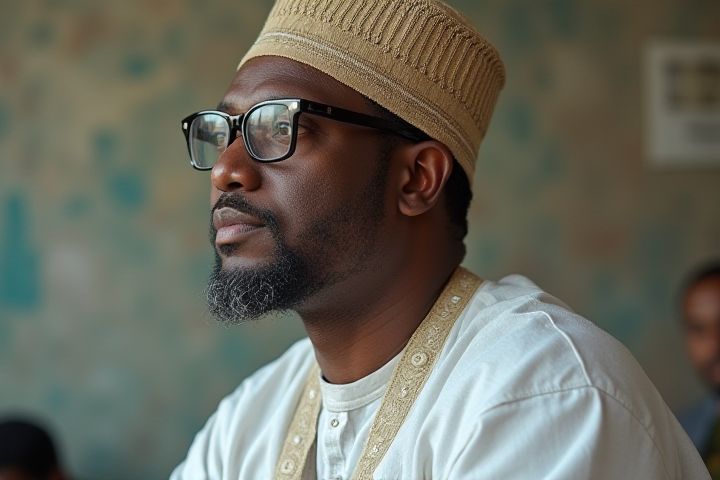
Nigeria's political climate is characterized by a complex interplay of democracy, ethnic diversity, and governance challenges. The country operates under a federal system, with power divided among the executive, legislative, and judicial branches, fostering both accountability and competition. Issues like corruption, electoral violence, and regional tensions significantly impact political stability and citizen engagement. You may notice that the rise of grassroots movements and increased youth participation signal a shift towards more active civic involvement. Regional disparities in political influence and economic development continue to fuel debates about resource allocation and national unity.
Multi-party democracy
Nigeria operates within a multi-party democracy, characterized by a vibrant political landscape where various political parties compete for power. The two dominant parties, the All Progressives Congress (APC) and the People's Democratic Party (PDP), influence legislative and executive outcomes, shaping national policies. Grassroots political movements and smaller parties have also emerged, reflecting diverse interests and promoting electoral participation among citizens. Engaging in Nigeria's multi-party system allows you to stay informed on regional dynamics and the shifting balance of power in the country.
Dominance of APC and PDP
The political climate in Nigeria is primarily characterized by the dominance of two major parties: the All Progressives Congress (APC) and the People's Democratic Party (PDP). The APC, known for its focus on economic reforms and anti-corruption initiatives, has played a significant role in shaping the nation's governance since its formation in 2013. In contrast, the PDP, which held power from 1999 to 2015, emphasizes social policies and infrastructure development, aiming to regain its influence in the political landscape. This binary party system often leads to intense competition, influencing policy decisions and voter behavior across the country.
Ethnic influence on politics
Nigeria's political landscape is deeply intertwined with its diverse ethnic groups, each wielding significant influence over regional and national policies. The major ethnic groups, including the Hausa-Fulani, Yoruba, and Igbo, often align with political parties that reflect their cultural identities and interests, shaping electoral outcomes. Ethnic-based conflicts and alliances frequently emerge, impacting governance and stability, as political leaders leverage ethnic loyalty to garner support. As you navigate this complex environment, understanding these ethnic dynamics is crucial for grasping Nigeria's ongoing political developments.
Focus on anti-corruption
Nigeria's political climate has increasingly centered on anti-corruption initiatives, reflecting widespread public demand for transparency and accountability. The government has implemented various reforms and established agencies such as the Economic and Financial Crimes Commission (EFCC) to combat graft and reduce financial mismanagement. Key measures include the enforcement of strict financial regulations and public service reforms aimed at enhancing integrity within institutions. As a citizen, engaging with these developments can empower you to advocate for a more transparent and accountable governance system.
Boko Haram insurgency
The political climate in Nigeria is significantly influenced by the ongoing Boko Haram insurgency, which has led to widespread violence and instability. Founded in 2002, Boko Haram has aimed to establish an Islamic state, primarily operating in northeastern Nigeria. This insurgency has resulted in a humanitarian crisis, displacing over two million people and exacerbating food insecurity in affected regions. The Nigerian government's response includes military interventions and international collaborations, yet challenges remain in achieving lasting peace and rebuilding affected communities.
Economic diversification efforts
Nigeria's political climate is increasingly centered on economic diversification to reduce reliance on oil revenues. The government has initiated various programs aimed at promoting sectors such as agriculture, technology, and manufacturing, with the aim of fostering sustainable growth. Efforts include investing in infrastructure, enhancing access to finance for small and medium enterprises, and creating a conducive environment for foreign investment. By diversifying the economy, Nigeria seeks to improve job creation and economic resilience, ultimately enhancing the standard of living for its citizens.
Electoral reforms and challenges
Nigeria's political climate is currently characterized by ongoing discussions surrounding electoral reforms and the significant challenges that accompany them. The introduction of measures aimed at enhancing transparency and integrity in the electoral process, such as biometric voting systems and independent electoral commissions, has sparked public interest. However, hurdles such as widespread voter apathy, electoral violence, and issues of corruption continue to undermine the effectiveness of these reforms. For you, understanding these dynamics is crucial in navigating Nigeria's complex political landscape as the nation approaches upcoming elections.
Youth activism and participation
The political climate in Nigeria is increasingly characterized by vibrant youth activism, driven by social media platforms and grassroots movements. Young Nigerians, motivated by issues such as employment, education, and social justice, are effectively mobilizing and demanding accountability from their leaders. This surge in youth participation is reflected in electoral engagement, with a notable increase in voter registration among the younger demographic. As they challenge traditional political norms, the youth are shaping the future of Nigeria's democracy and governance.
Regional power dynamics
The political climate in Nigeria is heavily influenced by regional power dynamics, with the country divided into six geopolitical zones, each wielding distinct economic, cultural, and political influence. The northern states often dominate the discourse on security and religious issues, while the southern regions, particularly the Southeast and Southwest, emphasize economic development and educational advancement. Ethnic diversity plays a crucial role, as various groups advocate for their interests, leading to complex inter-regional relationships and occasional tensions. Your understanding of these regional power structures is essential for grasping the broader political landscape, which is characterized by a delicate balance of influence among Nigeria's diverse populations.
Oil revenue impact on governance
In Nigeria, the political climate is heavily influenced by oil revenue, which constitutes a significant portion of the country's GDP and government funding. The reliance on oil has led to various governance challenges, including corruption and mismanagement of resources, affecting socioeconomic development. With fluctuating global oil prices, the stability of government budgets and public services remains vulnerable, impacting the overall governance framework. As a citizen, understanding the implications of oil dependence on political decision-making is crucial for engaging in meaningful discourse about Nigeria's future.
